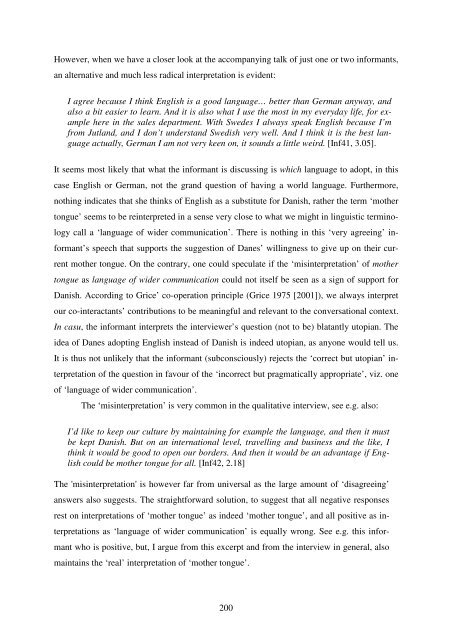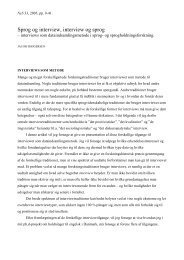Hør dog hvad de siger - Note-to-Self: Trials & Errors
Hør dog hvad de siger - Note-to-Self: Trials & Errors
Hør dog hvad de siger - Note-to-Self: Trials & Errors
Create successful ePaper yourself
Turn your PDF publications into a flip-book with our unique Google optimized e-Paper software.
However, when we have a closer look at the accompanying talk of just one or two informants,<br />
an alternative and much less radical interpretation is evi<strong>de</strong>nt:<br />
I agree because I think English is a good language… better than German anyway, and<br />
also a bit easier <strong>to</strong> learn. And it is also what I use the most in my everyday life, for example<br />
here in the sales <strong>de</strong>partment. With Swe<strong>de</strong>s I always speak English because I’m<br />
from Jutland, and I don’t un<strong>de</strong>rstand Swedish very well. And I think it is the best language<br />
actually, German I am not very keen on, it sounds a little weird. [Inf41, 3.05].<br />
It seems most likely that what the informant is discussing is which language <strong>to</strong> adopt, in this<br />
case English or German, not the grand question of having a world language. Furthermore,<br />
nothing indicates that she thinks of English as a substitute for Danish, rather the term ‘mother<br />
<strong>to</strong>ngue’ seems <strong>to</strong> be reinterpreted in a sense very close <strong>to</strong> what we might in linguistic termino-<br />
logy call a ‘language of wi<strong>de</strong>r communication’. There is nothing in this ‘very agreeing’ in-<br />
formant’s speech that supports the suggestion of Danes’ willingness <strong>to</strong> give up on their cur-<br />
rent mother <strong>to</strong>ngue. On the contrary, one could speculate if the ‘misinterpretation’ of mother<br />
<strong>to</strong>ngue as language of wi<strong>de</strong>r communication could not itself be seen as a sign of support for<br />
Danish. According <strong>to</strong> Grice’ co-operation principle (Grice 1975 [2001]), we always interpret<br />
our co-interactants’ contributions <strong>to</strong> be meaningful and relevant <strong>to</strong> the conversational context.<br />
In casu, the informant interprets the interviewer’s question (not <strong>to</strong> be) blatantly u<strong>to</strong>pian. The<br />
i<strong>de</strong>a of Danes adopting English instead of Danish is in<strong>de</strong>ed u<strong>to</strong>pian, as anyone would tell us.<br />
It is thus not unlikely that the informant (subconsciously) rejects the ‘correct but u<strong>to</strong>pian’ in-<br />
terpretation of the question in favour of the ‘incorrect but pragmatically appropriate’, viz. one<br />
of ‘language of wi<strong>de</strong>r communication’.<br />
The ‘misinterpretation’ is very common in the qualitative interview, see e.g. also:<br />
I’d like <strong>to</strong> keep our culture by maintaining for example the language, and then it must<br />
be kept Danish. But on an international level, travelling and business and the like, I<br />
think it would be good <strong>to</strong> open our bor<strong>de</strong>rs. And then it would be an advantage if English<br />
could be mother <strong>to</strong>ngue for all. [Inf42, 2.18]<br />
The 'misinterpretation' is however far from universal as the large amount of ‘disagreeing’<br />
answers also suggests. The straightforward solution, <strong>to</strong> suggest that all negative responses<br />
rest on interpretations of ‘mother <strong>to</strong>ngue’ as in<strong>de</strong>ed ‘mother <strong>to</strong>ngue’, and all positive as in-<br />
terpretations as ‘language of wi<strong>de</strong>r communication’ is equally wrong. See e.g. this infor-<br />
mant who is positive, but, I argue from this excerpt and from the interview in general, also<br />
maintains the ‘real’ interpretation of ‘mother <strong>to</strong>ngue’.<br />
200



